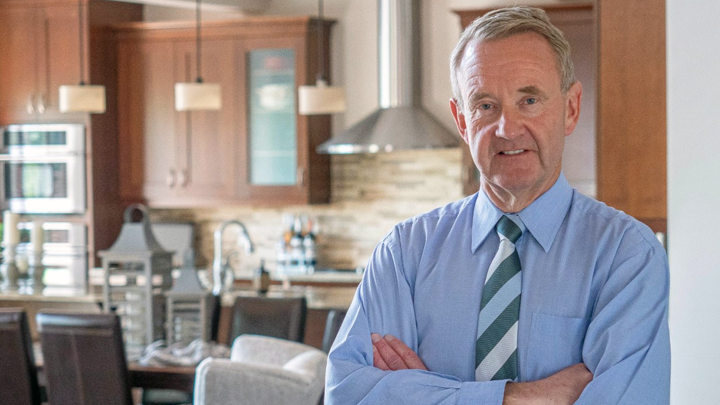
July 2, 2020

Membership in the World Economic Forum’s Global Coalition for Value in Healthcare lets Alberta Health Services play in the big leagues of healthcare and will bring future benefits to Albertans, says Dr. Richard Lewanczuk, Senior Medical Director, Health System Integration.
Story by Gregory Kennedy | Photo by Evan Isbister
The people-centred focus and groundbreaking wholistic systems approach of Alberta Health Services (AHS) have caught the eye of the World Economic Forum (WEF), which has invited AHS to join its Global Coalition for Value in Healthcare to play a role in shaping future healthcare on the international stage.
This recognition is a feather in the cap of AHS, one which promises benefits and resources for all Albertans down the road, says Richard Lewanczuk, Senior Medical Director, Health System Integration.
“Membership allows us to be internationally cutting-edge,” he says. “It lets us play in the big leagues.”
The goal of the global coalition is to accelerate the transformation toward value-based healthcare.
Formed last fall, the coalition asks its members: “How can we eliminate the US$3.2 trillion of annual global health spending that makes no or minimal contribution to good health outcomes?”
Says Lewanczuk: “The coalition shares our patient-centred views on healthcare, and how by putting people first, savings will flow naturally.
“We’re in august company — Harvard, the Mayo Clinic, Intermountain Health, Duke University and many others. As we become known, it will help us attract the best people, attract the best ideas and attract more research money. There’s a lot of benefit to having this membership.”
The coalition’s goals align with those of AHS when it comes to recognizing the rights of individuals and introducing more of a social responsibility into healthcare.
The evolving framework at AHS toward spending and value-based healthcare asks four questions:
“We’re adding a very human dimension to the fiscal dimension of healthcare,” says Lewanczuk. “It doesn’t mean, ‘Was it cheaper?’ It really means, ‘Does the care we provide make sense?’ ”
He cites knee-replacement surgery as the perfect example to highlight this philosophy.
“If you were an alien who came from Mars and looked at it, you’d say: ‘Why are you doing this surgery? It’s mostly people who are over the age of 65. They’re not in the workforce. They can be managed.’
“But that’s not our values. So ‘value’ is not so much ‘value’ as in financial value, but it’s what we ‘value’ as people. What we ‘value’ are mobility, independence and ending pain and suffering. So, therefore, we are going to pay for these replacement surgeries. And that’s just an example of our thinking.”
Being a member of the coalition also enables AHS to try more new ideas — and partner with others to multiply and expand the efforts of Alberta clinicians and researchers — and hasten the development of new therapies, thanks to funds invested by global corporations.
“There will be resources available to AHS because of the coalition’s industrial membership,” says Lewanczuk. “It gives us access to international corporations and business in the field of healthcare. We now have access to cutting-edge technologies and innovations in healthcare at an international level. And, of course, industry is always looking for partners who are doing innovative things, where they can test their ideas. So it’s to our mutual benefit.”
One such initiative that’s attracting growing global interest is virtual healthcare, an arena AHS is already exploring with its ‘virtual hospital’ concept.
“Here in Alberta, our initial results have shown that people who are part of this, who get to stay at home and get their hospital-level care at home, have a much better experience,” Lewanczuk says.
“The provider experience has been very good. We’ve had benefits in population and AHS expenditures have gone down on these people. So again, we’re not admitting them to hospital, which is much more expensive. They’re not showing up in the emergency department. We’re not having to put them into long-term care.”
Lewanczuk says he believes projects like this make AHS attractive to a major virtual-care company, and could lead to a mutually beneficial partnership now that AHS has joined the ranks of the invitation-only coalition.
“By pursuing value-based healthcare, we will achieve our goals,” he says. “But we’re not setting out with the expressed goal of ‘we need to cut costs’ — we’re now asking, ‘how can we provide care that best meets people’s wishes and needs?’ The beauty is, when we do this, cost savings follow.”